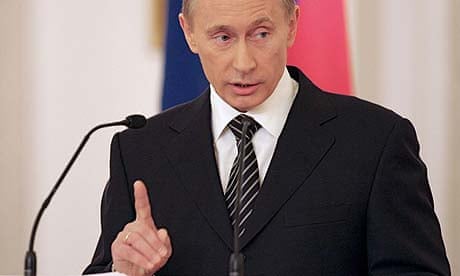The Kremlin was yesterday accused of mounting an unprecedented attack on academic freedom after one of Russia's top universities was closed.
The European University at St Petersburg (EUSP) has been forced to suspend its teaching after officials claimed that its historic buildings were "a fire risk". On Friday a court ordered that all academic work cease, classrooms be sealed and the university's library shut.
Academics at the EUSP said the move was politically motivated - and followed a row last year over a programme funded by the European commission to improve the monitoring of Russian elections. The university accepted a three-year, £500,000 EU grant to run a project advising Russia's political parties on matters such as how to ensure elections are not rigged.
Last October, the Russian president, Vladimir Putin, launched a vitriolic attack on the EUSP - which has close links with universities in the UK and US - accusing it of being an agent of foreign meddling.
On January 31, the EUSP's academic council bowed to Kremlin pressure and abandoned the monitoring project.
"It's clear [the closure] was politically motivated," Maxim Reznik, the leader of St Petersburg's opposition party, Yabloko, said. "We are observing a change in the political regime in Russia from authoritarianism to totalitarianism. What happened here is one example among many."
He added: "This hasn't got anything to do with fire risk. The university was carrying out important work in connection with election monitoring. Now it's being punished for it."
Putin has frequently attacked Russia's NGOs, human rights groups and reformist opposition - accusing them of being traitors and tools of the west. But the Kremlin has largely ignored the higher education sector, allowing academics relative freedom and autonomy over teaching, student selection and research - until now.
Yesterday the EUSP's rector, Nicolai Vahtin, said he hoped the university would reopen soon. "There's obviously been a misunderstanding. We are hoping to solve this in a couple of days," he said.
There were "no facts" to support or deny the suggestion the closure was political, he continued. "We are one of the best schools in the city and in the country. It would be a waste of talent and motivation to put us out of business."
Asked whether the EUSP was still functioning, he said: "The administration is working. But the courts have sealed the classrooms so there are no classes."
The university's EC-funded project was launched in February 2007. Its aim was to develop and raise the effectiveness of electoral monitoring in Russia's regions.
Putin's United Russia party took an immediate dislike to it. Last summer a party deputy demanded an investigation, and accused the university of trying to influence the result of the country's parliamentary and presidential elections.
Russia has been sensitive to persistent outside criticism of its electoral process, which independent observers say falls well short of international standards.
In December, the Organisation for Security and Cooperation in Europe (OSCE) described Russia's state Duma elections as "not fair", adding there had been "unprecedented abuse" of office by Putin.
Last week the OSCE said its observers would boycott Russia's March 2 presidential election because of Moscow's refusal to cooperate with the monitoring process - prompting a furious Kremlin response.
Backstory
Founded in 1994 on the initiative of St Petersburg's liberal mayor Anatoly Sobchak, the European University is one of Russia's top universities. A graduate school, it is known for its progressive views and western-educated staff. It has 120 Russian and 10-15 western students studying for an MA in Russian studies. Its aim is to integrate Russian scholarship with that of Europe and the US - at a time when Russian academia is becoming increasingly isolated from the west.
